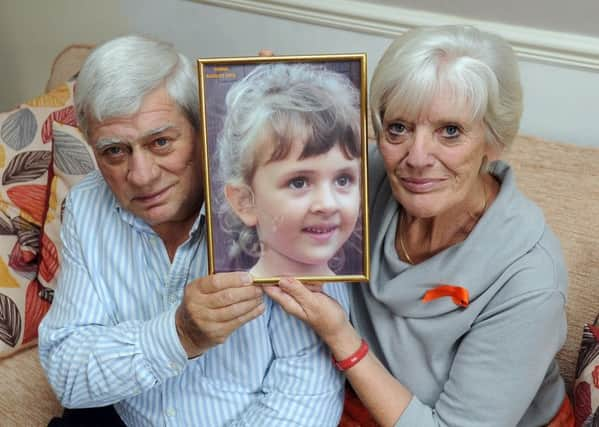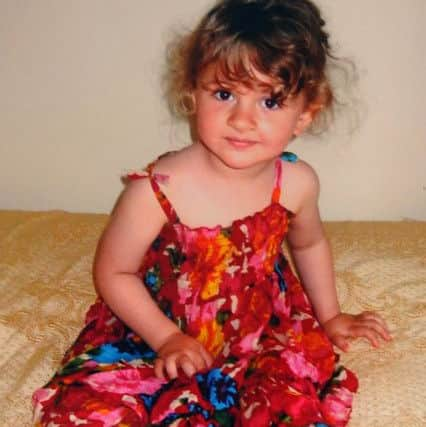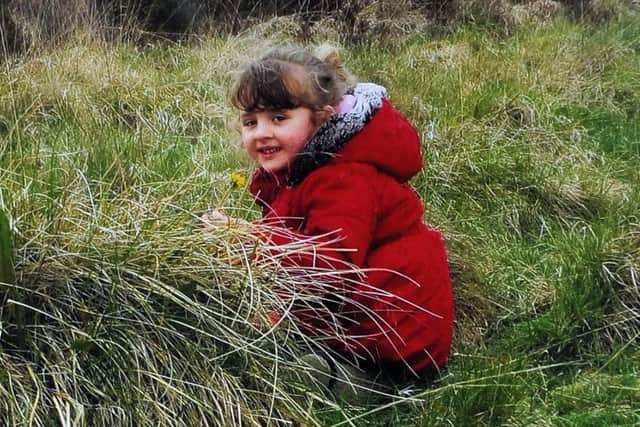Leeds grandparents’ distant tribute to tragic girl on drugs trial fighting cruel Batten Disease


Paul and Marilyn Dunford, who live in Rodley, were enjoying retirement and getting close to their son Neil’s daughter Yanna after they moved up north from Kent to be closer to family last year.
The smiley four-year-old was progressing like any other blossoming toddler, taller than many of her peers and quickly picking up reading and numeracy skills, until her nursery noticed she was having issues with language and was bumping into things.


Advertisement
Hide AdAdvertisement
Hide AdHer parents Neil, a mortgage advisor, and Dida, a qualified pilates instructor, took Yanna to their GP and she was referred to Leeds General Infirmary. They were given the devastating diagnosis of Late Infantile Batten Disease on June 24 2014.
The cruel condition starts at the age of three and sees children lose their mobility, speech and eyesight. Many children with the disease don’t live to see their teens.
Heartbroken by the news, her parents were offered the chance to take Yanna to the Bambino Gesù Hospital, in Lazio, Italy, to be part of a groundbreaking drug trial in September last year. Within a week they had flown out and continue to live there.
“It was absolute devastation,” retired theatre usher Marilyn said. “When they came back and went to the hospital as soon as I opened the door I just knew, and it was just the most awful thing in the world.


Advertisement
Hide AdAdvertisement
Hide Ad“She was a beautiful granddaughter doing so well and then everything falls down around your ears. Their futures are changed forever. Everything was so promising.
“We go to bed thinking about them and are thinking about them all day every day.”
The tight-knit family remains in weekly contact via Skype. Yanna’s mum Dida, who quit work as a pilates instructor to travel with her daughter, and dad Neil, who has taken a year’s sabbatical from work, are making every second count.
Granddad Paul, 69, who is a semi-retired electrical design engineer, said: “There were a lot of problems we didn’t have an answer for and then it all fell into place with the diagnosis. They were classic symptoms.”
Advertisement
Hide AdAdvertisement
Hide AdYanna is currently taking part in clinical research led by US drugs company Biomarin that has seen 24 children with Batten Disease given enzyme replacement treatment.
The process involves patients being given a new drug through a cranial catheter, sending it directly into the fluid surrounding the brain, in a bid to halt the condition’s decline.
Nevertheless Yanna’s deterioration is obvious and worrying. Despite early results being “encouraging”, she is rapidly losing her sight although the disease’s affect on her brain has stabilised.
Marilyn, who described Yanna as a young girl with a very sunny nature, said: “I did not imagine the changes would be so dramatic because of the treatment.
Advertisement
Hide AdAdvertisement
Hide Ad“In the year or so they have been there it’s really dramatic. To look at her beautiful eyes and to see them as they are now is heartbreaking.
“It’s going to be hard when we see them. We need to try not to let our feelings show.”
With all their efforts focused on supporting young Yanna through the treatment, Neil and Dida are hoping to return to the UK in September or October when they are expected to continue life on the trial at Great Ormond Street Hospital.
Earlier this year Margie Frazier, of the US-based Batten Disease Support and Research Association, described the Biomarin trial’s progress as “a notable moment, which holds promise for the children and families who are affected”.
Advertisement
Hide AdAdvertisement
Hide AdWithout such an option families affected by Batten Disease have few options aside from palliative, end of life, care to reduce seizures and physical rehabilitative care to help children retain muscle function for as long as possible.
Touched by the work done by the Batten Disease Family Association (BDFA), which aids UK families and research, Paul and Marilyn have been distributing leaflets and have raised £1,500 for the charity through donations, a cake sale at Bramley Tesco, collections at local pubs and events through friends in Flamborough.
“It’s little bits here and there but it all matters. It’s been quite mind-blowing what the BDFA does for a small charity – they have just been amazing,” Paul added. “We just want to make Yanna’s life as good as we can do. We are just here for them at the end of the day.”
To donate to the Dunford’s fundraising effort visit justgiving.com/c-paul-dunford.
RARE CONDITION WITH A HUGE IMPACT
Advertisement
Hide AdAdvertisement
Hide AdThe Dunfords are the second Leeds family to be affected by Late Infantile Batten Disease within the space of a year.
Six months before Yanna’s diagnosis of the condition, which affects only around one to three children in the UK every year, Duncan and Lynsey Brownnutt, from Cookridge, were told both of their children had the genetic disorder.
Ellie Mae, six, passed away in May, while Caleb, five, is deteriorating. Duncan and family friend Rod Wark raised £12,500 for the BDFA through a tandem bike ride this month.